Brian Clegg's Blog, page 35
April 16, 2019
Dead Simple - Peter James.- review
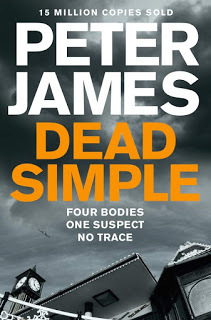 A good British crime novel is a wonderful thing, and I felt fairly confident coming to Dead Simple because according to the cover it has sold 14 million copies. But, for me, it was a huge let down.
A good British crime novel is a wonderful thing, and I felt fairly confident coming to Dead Simple because according to the cover it has sold 14 million copies. But, for me, it was a huge let down.Peter James manages a couple of interesting twists and turns along the way, which I presume accounts for those sales. But the characters are mostly two-dimensional, the plot is incredibly far fetched - and this is a world where mediums can solve crimes.
There are a couple of interesting ideas in the plot line, but the trouble is that James piles coincidence on unlikelihood to produce a ludicrously infeasible string of events. Add to this a deus ex machina ending dependent on a psychic's ability to exactly locate a missing person using a pendulum and a map (why do we bother with the police, when psychics could just solve all the crimes?) and the result is a book that convinces me not to take another step in the Roy Grace series.
I usually put links to Amazon at this point - but I can't see why I would.
Published on April 16, 2019 10:06
April 8, 2019
How statistics can be right but still misleading
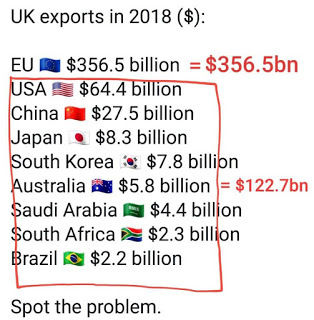 We are bombarded with statistics all the time in the news, on social media, from government and science. Sometimes they are very useful. At other times they are simply wrong. But there's an in-between way to use statistics - deliberately or otherwise - that is both accurate and misleading.
We are bombarded with statistics all the time in the news, on social media, from government and science. Sometimes they are very useful. At other times they are simply wrong. But there's an in-between way to use statistics - deliberately or otherwise - that is both accurate and misleading.I just want to give two examples, though there are many more out there. If you want to find out more about the use and misuse of statistics, I'd recommend my book Dice World on the impact of randomness, probability and statistics on our lives and David Spiegelhalter's book The Art of Statistics to get an introduction to how statistics are created, used and misused.
The first example is a deliberate attempt to mislead. The graphic at the top right has been circulated on Facebook. The idea is the this demonstrates the problem with Brexit by showing how important the EU is to us an export market. It doesn't matter if you agree or disagree with Brexit, the issue here is how the numbers are being used. I'd say there are three distortions here. The first is that it's perfectly possible to have Brexit and not to damage EU exports. Secondly, the numbers are bizarrely stated in US dollars - the only reason I can think for this is that it makes the EU amount seem bigger. Finally, there's the matter of the dog that didn't bark. Because around $350 billion of non-EU exports is missing. Bear in mind, I'm not saying the numbers are wrong - the EU is a hugely important market for the UK. But to omit around the same amount of non-EU exports as there are EU exports could only have been done to make the EU seem more important than it really is. That's bad, and clearly deliberate.
 More subtle is something that happened when it was announced that eating bacon increased your risk of bowel cancer. We saw headlines like this in the Guardian, pointing out that eating a couple of rashers of bacon a day 'would raise the risk of getting bowel cancer by 18% over a lifetime.' This is true, but with a huge proviso. That 'risk', which sounds terrifyingly huge, is a relative risk, not an absolute one. It's the increase in risk in what is a relatively low risk overall. If you turn that into an absolute risk - which is what most readers would expect - i.e. if I eat bacon every day what is the chance that it will give me cancer over my lifetime, the risk is not 18% but 1%. That feels rather different. It's still a risk - it's still important to know. But it's far more meaningful than the relative risk. Again, the statistics are accurate (though their interpretation may not be: former University College pharmacology professor David Colquhoun has argued strongly from earlier versions of the data that the interpretation is suspect because there is only weak evidence of causality) - but the way it is presented (either intentionally or accidentally) is highly misleading.
More subtle is something that happened when it was announced that eating bacon increased your risk of bowel cancer. We saw headlines like this in the Guardian, pointing out that eating a couple of rashers of bacon a day 'would raise the risk of getting bowel cancer by 18% over a lifetime.' This is true, but with a huge proviso. That 'risk', which sounds terrifyingly huge, is a relative risk, not an absolute one. It's the increase in risk in what is a relatively low risk overall. If you turn that into an absolute risk - which is what most readers would expect - i.e. if I eat bacon every day what is the chance that it will give me cancer over my lifetime, the risk is not 18% but 1%. That feels rather different. It's still a risk - it's still important to know. But it's far more meaningful than the relative risk. Again, the statistics are accurate (though their interpretation may not be: former University College pharmacology professor David Colquhoun has argued strongly from earlier versions of the data that the interpretation is suspect because there is only weak evidence of causality) - but the way it is presented (either intentionally or accidentally) is highly misleading.No one is saying we should ignore statistics. But we need to be careful about taking what we read in the papers (or even more so on social media) at face value. At the very least, if it's not possible to dig down and see where the numbers come from we should be highly suspicious.
Published on April 08, 2019 08:15
January 2, 2019
Two books with a social conscience - review
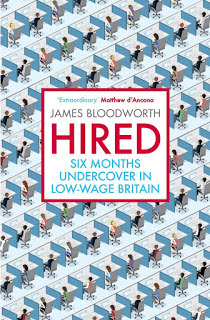 Purely by coincidence, I asked Father Christmas for two sort-of travel books with a social conscience, so it's handy to be able to review them both together.
Purely by coincidence, I asked Father Christmas for two sort-of travel books with a social conscience, so it's handy to be able to review them both together.The first I read was James Bloodworth's Hired. Rather like a modern version of Orwell's Road to Wigan Pier, Bloodworth's book describes six months 'undercover in low-wage Britain.' Bloodworth takes on jobs in an Amazon warehouse in Rugeley, as a care worker (sort of) in Blackpool, in a call centre in the South Wales Valleys and as an Uber driver in London.
His experiences provide valuable insights into the life that goes with these low wage jobs. The workers face two huge problems - not being paid enough to live on and oppressive working conditions, including zero hours contracts. The low pay was potentially the case in all the examples (in principle, the Uber driving could have produced a better return), while the conditions varied from the extremely iffy at Rugeley to pleasant enough at the Admiral call centre, where Bloodworth had to struggle to find anything to complain about other than a boring job and the company culture being a little too jolly.
The tasks at Rugeley and in Blackpool were also like to leave the worker so worn out that they had very little other life. At least, in principle this applied in Blackpool, as Bloodworth was never able to actually do the job because his Disclosure and Barring Service clearance did not come through in time for him to undertake the task, though he was able to shadow another worker for part of his time there.
Bloodworth does a good job in uncovering the reality of these jobs and the lives of those who undertake them. He claims that he is only observing and doesn't offer solutions, but in an epilogue does give a little thought to this. Suggestions (from here and elsewhere) of a realistic living wage, the ability to be unionised and end to zero hours contracts are straightforward and sensible. However, Bloodworth's analysis does skip over one thing that comes across glaringly in his account. This low wage economy is propped up by freedom of movement. Reading the book made me significantly more sympathetic to Jeremy Corbyn's viewpoint that leaving the EU would be beneficial because companies would have to pay more without a ready supply of low paid EU nationals to fill these posts. Of course that means more cost to consumers and taxpayers, but surely that is worthwhile to avoid such poor working conditions?
Will reading this book make me stop using the companies and services Bloodworth mentions? No - that would inconvenience me and wouldn't help the workers. But the picture it gives of these low pay jobs does encourage me to look to future governments for a better living wage and improved worker's rights.
Hired is (ironically) available from Amazon.co.uk and Amazon.com
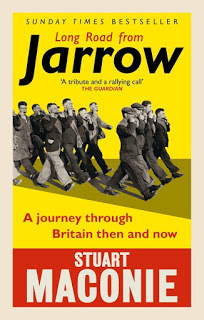 One thing that does come through, particularly in Bloodworth's coverage of Blackpool is another parallel with George Orwell - a touch of comfortable South-East driven disgust at the poor provincials. This certainly isn't the case in the other book I read, Stuart Maconie's Long Road from Jarrow. For me, Maconie has taken over from Bill Bryson as the doyen of humorous British travel writing. This title is a touch more serious than his previous ones, but still allows for his warmth and friendliness to come through. Maconie follows the path of the 1936 Jarrow march, when 200ish steelworkers marched to London to present a petition asking for government assistance in creating new jobs after their steelworks closed.
One thing that does come through, particularly in Bloodworth's coverage of Blackpool is another parallel with George Orwell - a touch of comfortable South-East driven disgust at the poor provincials. This certainly isn't the case in the other book I read, Stuart Maconie's Long Road from Jarrow. For me, Maconie has taken over from Bill Bryson as the doyen of humorous British travel writing. This title is a touch more serious than his previous ones, but still allows for his warmth and friendliness to come through. Maconie follows the path of the 1936 Jarrow march, when 200ish steelworkers marched to London to present a petition asking for government assistance in creating new jobs after their steelworks closed.Day by day, the book follows the stages of the march exactly 80 years on from the original. Maconie gives a mix of well-researched history, delving into the reality of a march that many will have heard of, but most only have a vague idea about (like many others, I associated it with mining and the depression of the 1920s), bringing in his own experiences on the walk. The timing of the book is also brilliant as he was able to include reflections on the Brexit vote in the UK and the American election of Donald Trump.
The only downside of the theme of the book is that Maconie does not have as much freedom to do as he wants - he has to stick to the daily schedule - as a result of which, there is rather less humour and social interaction than in his other books - but that sacrifice is well worth it. Whether he is revelling in diverse eating places along the way (Maconie says people complain he talks too much about food, but for me that's part of the charm of his writing), wryly commenting on socialist meetings he attends or reflecting on the Hillsborough disaster as he passes through Sheffield, Maconie is engaging and insightful. It's the kind of book where it's difficult to avoid sharing snippets with others in earshot.
One example of his insight that Bloodworth would have been unable to share was in his assessment of the reasons for Brexit. With a deep understanding of why Northerners in particular may feel a resentment that spilled over in a response to the Brexit vote that was unexpected from the comfortable metropolitan elite, Maconie is able to say why he is against Brexit - but also tearing apart the attitude of those who label Brexit supporters racist and ignorant. He clearly understands and explains the drivers for this decision.
However, as much as it features, this isn't a book about Brexit, and Maconie brings the story of the Jarrow Crusade alive, with its many unexpected twists and turns, whether it's a warm welcome for them from the establishment Ripon Cathedral (and Maconie's own delight at attending choral evensong) or the varied accommodation and receptions the marchers received along the way, including terrible treatment at Westminster, where their petition was practically ignored. Maconie manages to celebrate multicultural Britain now, while still being strongly aware of the very English nature of the march, the landscape and the social climate then and now. An excellent book.
Long Road from Jarrow is available from Amazon.co.uk and Amazon.com
Published on January 02, 2019 05:48
December 4, 2018
Canute and the High Street
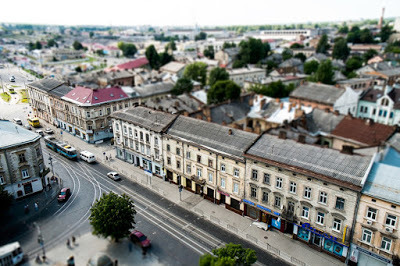 Hardly a week goes by without some report or newspaper article bemoaning the loss of traditional high street shopping. Everyone has an opinion on how to save the high street, from Mary Portas's ill-fated appointment as 'high street tsar' to the little-loved Mike Ashley's dire suggestion that the answer to the problem is to levy a 20% tax on online sales - which would simply make the consumer pay more but is unlikely to change shopping habits. I think it's time we took a lesson from King Canute.
Hardly a week goes by without some report or newspaper article bemoaning the loss of traditional high street shopping. Everyone has an opinion on how to save the high street, from Mary Portas's ill-fated appointment as 'high street tsar' to the little-loved Mike Ashley's dire suggestion that the answer to the problem is to levy a 20% tax on online sales - which would simply make the consumer pay more but is unlikely to change shopping habits. I think it's time we took a lesson from King Canute.For those not familiar with the legend of this tenth century king of Denmark, England and Norway more properly named Cnut, he is said to have tried to order the tide to stay off the beach. The tale tends to be presented these days with Cnut as fall guy, idiotically over-valuing his own ability, though it originally involved Cnut using his attempt as a demonstration to his courtiers that even a king is limited in his power compared with God's forces of nature.
I believe that all the failing attempts to bring shopping back to the high street entirely miss the point. There's a reason we shop online or in out-of-town shopping centres. Unless you live in the town centre, it's not a convenient place to shop. So rather than try to force us to do something we don't want to do, why not change what town centres are for? If instead we made it far easier to convert commercial premises into accommodation, we could see the high street becoming again what it was in the first place - primarily living accommodation with as much commercial use as it can sensibly support.
If you look above the shop windows at the buildings in a typical British high street you will usually see what used to be housing. (Take a look at the picture above.) These upper floors are now usually store rooms or, more often than not, simply not used at all. By converting the buildings back to accommodation we could see town centres attractive places to live again. And with more people living there, there will be more demand for town centre pubs, restaurants, coffee shops, theatres and cinemas. In turn these facilities may even result in so many people coming back into towns that town centre shops thrive once again. But the point is that by putting the focus on people, not propping up failing businesses, we would be driving the future of the high street from the right perspective.
Forget high street tsars and trying to punish online retailers and out of town malls. Let's give incentives instead to make high streets living communities once more.
Published on December 04, 2018 07:02
October 12, 2018
The smart meter swindle
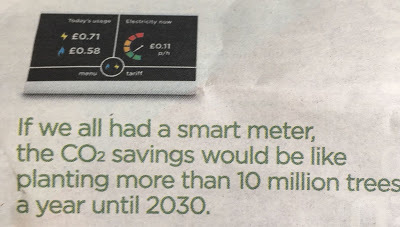 I was mildly irritated by an advert for smart meters in my newspaper, placed by ‘The campaign for a smarter Britain.’ It claimed ‘If we all had a smart meter, the CO2 savings would be like planting more than 10 million trees a year.’ Note this says would not could - a claim that cannot be factual. The ad even emphasises this by having small print saying ‘Savings possible by customers measuring energy use and cutting waste.’ Possible is true, would be isn’t.
I was mildly irritated by an advert for smart meters in my newspaper, placed by ‘The campaign for a smarter Britain.’ It claimed ‘If we all had a smart meter, the CO2 savings would be like planting more than 10 million trees a year.’ Note this says would not could - a claim that cannot be factual. The ad even emphasises this by having small print saying ‘Savings possible by customers measuring energy use and cutting waste.’ Possible is true, would be isn’t.What the ad doesn’t point out is that exactly the same savings are possible without smart meters if people cut back on their energy use. It's entirely possible that everything the smart meter could achieve in energy savings could also be obtained by giving customers a laminated card with a priority list for things to switch off to save energy. At a tiny fraction of the cost.
In practice, smart meters are being pushed by the energy companies for two reasons. One is that they can save money by not employing meter readers. And the second is that they can introduce complex tariffs that charge more in peak periods, making billing much harder to understand and preventing users from getting the best deal.
Simples.
This has been a Green Heretic production.
Published on October 12, 2018 00:25
October 11, 2018
Sleeping with the Lights On - Review
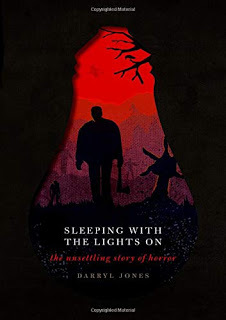 Before considering the contents, I ought to say what a great-looking book this is - small and beautifully formed with a really unusual cutaway front. It's a great gift book if you know someone who's into their horror. Because that's the topic we're dealing with here: ghosties, ghoulies, long-leggity beasties and things that go bump in the night.
Before considering the contents, I ought to say what a great-looking book this is - small and beautifully formed with a really unusual cutaway front. It's a great gift book if you know someone who's into their horror. Because that's the topic we're dealing with here: ghosties, ghoulies, long-leggity beasties and things that go bump in the night.There is always a danger in having an academic write about genre fiction that it all gets a little po-faced (or, in this case, Poe faced). And, I'm afraid, Darry Jones, an English professor specialising in nineteenth century literature and popular fiction, does rather have this tendency. It's not that his analysis lacks interest, but it can be a touch short on readability. There's also a distinct over-reliance on Freud, apparently not realising his work, from a scientific viewpoint, is more fiction than science.
The book is divided into sections on monsters - including, of course, vampires and zombies - 'the occult and the supernatural', 'horror and the body', 'horror and the mind' and 'science and horror' (featuring Frankenstein), with a final section that highlights twenty-first century work. It covers books, film and TV, though the medium that comes across strongest is film. It did seem that on the book side, there was a heavy bias to the literary over the popular (Jones, for example, doesn't distinguish sufficiently between the covers of Dennis Wheatley's books and their content), where the approach to films verges on the trashier the better - but I suppose that reflects the academic reverence for 'literature'.
I've always been more into science fiction and some areas of fantasy than out-and-out horror, partly because I see no entertainment value in gore, but it's interesting to read about genres that give us insights into readers and writers, and there's no doubt that Sleeping with the Lights On really delivers in this respect. There's plenty of enjoyment of discovery - for example, I was interested to learn that Arthur Conan Doyle’s father was a painter who specialised in fairies, given Conan Doyle's disastrous Cottingley fairies photographs incident.
I was all set to give Jones a drubbing for having a whole sub-section on vampires without mentioning one of the greatest TV shows of the turn of the millennium, Buffy the Vampire Slayer. This omission seemed to illustrate perfectly the over-seriousness of some of the text... except, in practice, Jones merely keeps Buffy, with its excellent subversion of the genre and inversion of expectations to the end as an example of the way things should be. There was an effective contrast here with some of the moribund churning out of sequels and copies that often typifies Hollywood horror. While I still feel that Buffy ought to have at least been touched on in the vampire section, this was excellent to see.
Overall, this is a genuinely attractive object, and a book that will make both the horror fan and the horror hater think again about the genre.
Sleeping with the Lights On is available from Amazon.co.uk and Amazon.com.
Published on October 11, 2018 01:52
October 10, 2018
Why you have (probably) not already bought your last car
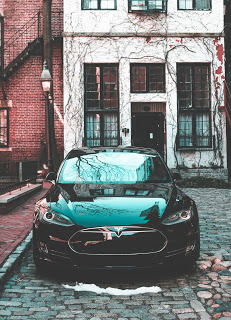 Photo by Alex Iby on UnsplashI have just read an (unintentionally) hilarious article on the BBC News website. In it, Justin Rowlatt sets out arguments as to why you have (probably) already bought your last car. Aware that this sounds a little unlikely, Rowlatt starts by suggesting we'll be scoffing - I'm not. I understand the arguments - but I think they show an impressively bubble mentality.
Photo by Alex Iby on UnsplashI have just read an (unintentionally) hilarious article on the BBC News website. In it, Justin Rowlatt sets out arguments as to why you have (probably) already bought your last car. Aware that this sounds a little unlikely, Rowlatt starts by suggesting we'll be scoffing - I'm not. I understand the arguments - but I think they show an impressively bubble mentality.The article tell us 'tech analysts' predict that in less that 20 years we'll all have stopped owning cars and all cars will be electric. Let's leave aside the obvious point that most of us buy cars more frequently than every 20 years and look at the main arguments in the article. They are:
Self-driving cars cut taxi journeys from $10 to $5Electric cars have less moving parts so should last at least 500,000 milesElectric car prices will fall as they become mainstream, reducing self-driving journeys even further to $1Accident rates will plummet. Within 10 years 95% of journeys will be self-driving and human drivers will be banned.'Don't worry that rural areas will be left out. A vehicle could be parked in every village waiting for your order to come.'So let's take fast dominance of electric cars first. I would love to have an electric car - but I simply can't afford one at the moment. To get a reasonable range for non-urban driving (300 miles), there's pretty much nothing under £55,000 new. I could get a new petrol car with that range for £6,000. That's a big differential. And what about used? At the moment there are more than three times as many used car sales in the UK as there are new. It will take a long time before there are enough electric cars in the used car market to dominate.
As for the technology claim - it may be true, but it's also highly misleading. Electric cars do have fewer moving parts - but there's a lot more complex technology to go wrong. Crucially, that 500,000 mile figure ignores a typical battery life of 100,000 miles. Then you have a bill of between £5,000 and £25,000 depending on the car. That's more than many people pay for a new car now.
So now let's move from the car itself to those self-driving, shared vehicles. Let's say (highly doubtful) they really could reduce the cost of a taxi-style journey to 10% of its current value. Do you really think that means the price will be reduced by the same amount? If so, please consider buying Tower Bridge off me, as I've got it available at a bargain rate. But I also don't think this 10% value takes in the extra costs involved. Remember Manchester's equivalents of Boris bikes - Mobikes. They lasted all of a year before being withdrawn due to vandalism. How do you think driverless taxis will fare?
The accident rate argument is a good one, but it omits one huge psychological problem which I think is hardly ever addressed. Driverless cars will save lots of anonymous lives, but will kill lots of people with friends and relations to complain about them. At the moment around 1,700 people are year are killed on the road in the UK (and over 1 million worldwide). Yes, it would be wonderful if we could drop that to, say, a quarter of the current value. That's saving over 1,200 lives a year in the UK. But that would still mean over 400 people killed by driverless cars each year. And that's a lot of lawsuits. We accept a small risk to use preventative medicine. Vaccines harm a few people, but save many. However the percentage risk we tend to accept is very small, and I'm really not convinced that driverless cars (which have already killed people) will ever get down to acceptable levels.
I've kept the best til last - 'Don't worry that rural areas will be left out. A vehicle could be parked in every village waiting for your order to come.' I'm sorry, but this is such a city-centred view. Surely Rowlatt has never lived in a village. I used to live in a village with about 2,000 inhabitants. During 1 hour each workday morning around 200 cars left the village for work and on the school run. Do you think those 200 families would read 'A vehicle could be parked in every village waiting for your order to come,' and think 'That's okay, then'?
Let's take it up a notch. I now live in Swindon, a town with a population of around 200,000. Again, is it realistic to think that there could be enough cars for the peaks available in Swindon? Even at this size, we aren't big enough to justify Uber setting up, while Deliveroo only covers a very small central area of the town. Shared facilities only work with a high enough density of requirements for short journeys.
And I think that's at the heart of the perception gap between Rowlatt plus his 'tech analysts' and the rest of the country. The prescription would work in London and a few other big cities, but not for the vast majority of towns and villages. I'd suggest a good measure is that this approach could work where it's possible to summon a black cab by stepping onto the pavement and waiting a minute or two. So that's London and probably a handful of other UK cities. Outside very high density occupation with mostly very short journeys this timescale is not going to happen.
Published on October 10, 2018 02:37
October 2, 2018
Oberland - new fantasy thriller
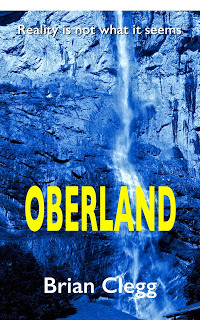 Although my main business is writing science books, I've always enjoyed writing fiction and I've recently had the chance to revisit a title I made a first draft of about 30 years ago. It's now finished and available (if you use Kindle, you can get a copy free of charge if you download it by Friday 5 October 2018 at the latest - see Kindle links here).
Although my main business is writing science books, I've always enjoyed writing fiction and I've recently had the chance to revisit a title I made a first draft of about 30 years ago. It's now finished and available (if you use Kindle, you can get a copy free of charge if you download it by Friday 5 October 2018 at the latest - see Kindle links here).Called Oberland, the book is set in the Swiss alps, centring on the beautiful Lauterbrunnen valley. I wrote parts of that first draft while on holiday there, so the locations were still very fresh in my mind.
In the story, when English twenty-something Jo Fuller takes a summer job on a campsite in the Swiss alpine valley of Lauterbrunnen, she does not expect her whole understanding of the world to be turned upside down. A camper dies in suspicious circumstances. With three broken individuals - Bob from America, Paula from Australia and Werner from Germany - Jo discovers a strange alternative world at the top of the Schilthorn mountain.
Each of the four faces death at the hands of the inhabitants of the alternate world, intent on preserving their secret. But Bob has something that may keep them alive. Amongst the beautiful Swiss mountains, each must face up to their fears and survive. This fast-paced fantasy thriller leaves Jo, Bob, Paula and Werner unsure who to trust as they attempt to uncover the secret of the mountain before it is too late.
It was a lot of fun writing it - I hope it's just as enjoyable to read.
You can find more details and links to buy either the paperback version (direct from me, or from Amazon), plus the Kindle ebook on this web page.
Published on October 02, 2018 07:12
August 24, 2018
Statistics can be true but misleading - shock, horror, alcohol is bad for you
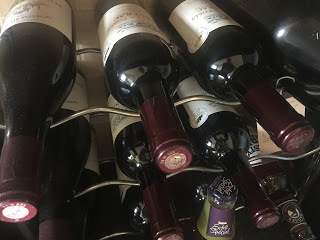 Headlines on the BBC News tell us starkly (if somewhat smugly) 'No alcohol safe to drink, global study confirms.' But like all statistically-based stories, the devil is in the detail.
Headlines on the BBC News tell us starkly (if somewhat smugly) 'No alcohol safe to drink, global study confirms.' But like all statistically-based stories, the devil is in the detail.First port of call in any such situation is David Spiegelhalter, the Winton Professor of Public Understanding of Risk at Cambridge. And the story, according to him, is rather different from the scare headlines. He starts by pointing out a bizarre omission in the paper quoted - they only show relative risk, not absolute risk.
The trouble with relative risk is that it is often hugely misleading. Imagine the headline 'Murder rate in city increases by 100%'. Wow - that city appears to have hit the ropes, big time. However, that is a relative statistic. We don't know what that 100% represents. Exactly the same data could also be represented by the headline 'One murder last year, two murders this year.' That is a 100% increase. But far less scary sounding. So the paper's authors should be reprimanded. Luckily, though, apparently the press office, often the villains in misrepresentations of papers, actually published the real numbers - which to the BBC's credit, they do use, rather than just the relative values.
And what do those real numbers say? Four people in 100,000 who had around 1.25 units of alcohol a day would develop a related health problem or sustain an alcohol related injury in one year (it's hard to imagine how 1.25 units could be shown to cause an injury, but we'll overlook that). That's a low number. All activities have risks attached (getting out of bed, crossing the road, going in a car...). And that's not even considering relatively high risk activities. Life involves risk. The mere existence of risk is not in itself a reason not to do something - there's always a cost/benefit tradeoff, and many people who drink relatively small amounts get considerable pleasure from it.
This is why it's worrying that the paper goes on to say that their findings suggest public health bodies should consider recommending total abstention. The significant problem here is not light drinkers, but heavy drinkers, where the risks start to go up in a big way.
Something the BBC doesn't cover is Spiegelhalter's other key point, which is also interesting. He notes that this study seems to contradict earlier research which showed that those who abstained from drinking alcohol had a significantly higher (20%*) death rate than moderate drinkers. I have already seen this used elsewhere in an attempt to debunk the science - but that's the wrong message to take away. This higher death rate was from all causes, not just specific alcohol-related causes. And as Spiegelhalter points out, the kind of people who are advised by their doctors not to drink any alcohol tend to be those who have serious medical problems. It's not the lack of alcohol that kills them, it's those problems.
So, media people - please be careful how you use statistics. It's fine to report studies like this. But don't - as the BBC did - put just part of the essential explanation right down at the bottom and make it sound like a minor quibble, rather than something that goes against your shock headline and the tenor of the vast majority of the article.
* Yes, I know this is a relative statistic, but this is the kind of circumstance where they are useful.
Published on August 24, 2018 03:31
July 24, 2018
Cost is as important as benefit in recycling
 Not easy to clean
Not easy to clean(Photo by Steven Lilley from Wikimedia )The other day on the radio, some government person or other was berating the poor old householder. He was asked by the interviewer why it was that a surprisingly high percentage of plastic sent for recycling ends up in landfill. He pointed out that the lazy old taxpayer often doesn't wash out their sauce bottles properly, so they can't be recycled.
This made me think - I have never seen a proper environmental cost/benefit on recycling. I do recycle - I'm all in favour - but, for example, in the case of the sauce bottle, I generally send it straight to landfill. This is because there is a considerable energy use in washing out a sauce bottle - it usually takes a fair amount of hot water and quite possibly some washing up liquid. It also takes up some of my time, which also has a cost (I assume the reason the recycling companies don't themselves wash out sauce bottles is that the cost outweighs the benefit.)
I don't know for certain how the balance lies as I've never seen appropriate figures, but my suspicion is that more environmental damage is done by cleaning out the bottle (and transporting it far further for recycling than for landfill) than is done by sticking it in a hole in the ground.
So, yes, government, please do encourage us to recycle sensibly - but give us the data to make it sensible. When a green activity is done for show, rather than to help the environment, it's greenwash - and I think this particular complaint about the householder is exactly that.
This has been a Green Heretic production.
Published on July 24, 2018 05:13



